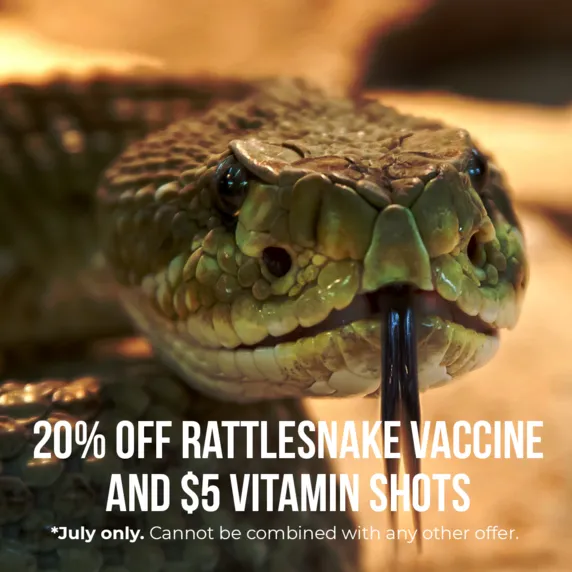As the temperature rises, injuries tend to increase for both people and pets. Following our list of dos and don'ts will help you and your pet enjoy a happy, injury-free summer.
Don't Leave Your Pet in a Parked Car
In the time it takes you to dash into the grocery store for a few things, your pet could develop heatstroke or even die. According to the American Veterinary Medical Association, the temperature inside your car or truck can increase by 20 degrees in 10 minutes, 30 degrees in 20 minutes, and 40 degrees in 1 hour. Temperatures can rise dangerously high even if you crack the windows. If your pet isn't welcome inside stores or businesses, it's best to leave it at home.
Do Protect Your Pet's Paws
Hot pavement can quickly burn your pet's paws. Limit walks to early morning or dusk on particularly hot days. Test the pavement with your hand before you go for a walk. If the pavement is uncomfortably hot, it's too hot to take your dog or cat for a walk.
Don't Let Pets Loose in Cars
Unsecured pets are more likely to be injured during an accident and can be the cause of vehicular accidents. Loose pets may interfere with your vision or ability to control the vehicle.
For safety's sake, place your pet in a harness or carrier. Use the seatbelt to secure the carrier or harness. The back seat is the safest location for pets, as an inflated front seat airbag could injure or kill your dog or cat.
Does your dog like to keep its head out the window during car trips? Your pet could hit its head on a street sign or branch or experience an eye injury from airborne debris.
Do Supervise Pets Around Water
It only takes a second for a pet to drown in a pool, lake, stream, pond, ocean, or other body of water. Don't take your eyes off your pet for a minute around the water.
Contrary to popular belief, all dogs don't have the innate ability to swim. Dogs with short legs and long bodies can struggle in the water, according to the American Kennel, as can dogs whose body weight isn't evenly distributed. A life jacket or flotation vest will protect a dog that isn't a good swimmer or hasn't been in the water before.
Don't Leave Your Pet Outside for Too Long on Hot, Humid Days
Bring your pet inside during the afternoon hours on hot, humid days or at any time of the day if your area is in the midst of a heatwave. Safe temperatures for animals can vary depending on the pet's breed and age.
If your pet is panting or seems lethargic, bring it inside immediately. Take your pet to the veterinarian immediately if it exhibits signs of heatstroke, which include trouble breathing, constant panting, 104 temperature or higher, fast heart rate, weakness, drooling, seizures, vomiting, and collapse.
Do Keep Dangerous Substances and Items Away from Your Pet
Lawn care products, like insecticides and weed killers, can sicken or kill your pet if ingested. Wait until the product dries completely before letting your pet play on your lawn or use non-toxic products.
Don't Leave Windows Unscreened
Pets are naturally drawn to open windows and can fall if they are not screened. Although screens can help protect your pet, larger or heavier pets can still fall through. Childproof window guards offer extra protection and are a must for rooms above the first story.
Do Follow Safe Fireworks Practices
Do you plan to set off fireworks in your backyard this summer? Your pet could be seriously burned investigating a spent or unfired firework. Keep your dogs and cats away from fireworks and sparklers.
Constant loud booms from fireworks can also make summer a frightening time for some dogs. If fireworks terrify your pet, create a safe haven in a quiet place in your house, such as a large, windowless closet. Playing music or using a white noise machine may drown out the noises or make them seem less startling.
If your pet does become injured this summer, prompt veterinary care is essential. Contact us to schedule an appointment for your companion.
Sources:
ASPCA: Hot Weather Safety Tips, American Veterinary Medical Association: Pets in Vehicles, American Kennel Club: Can All Dogs Swim? How to Teach a Dog to Swim, 6/3/21
The Most Common Vaccinations for Your Cat and Dog
Vaccinations protect your cat or dog from illnesses that could cause serious health complications or even death. Vaccines boost your pet's immune system, preventing illness or making symptoms much less severe. This is especially now that we are all heading outside and our pets are interacting with other pets.
Vaccines Your Dog Needs
These core vaccinations are recommended for all dogs:
- Rabies. Your dog can catch rabies from the bite or scratch of an infected dog, cat, bat, skunk, fox, raccoon, or another wild animal. Unfortunately, rabies is usually fatal. There are about 5,000 rabies cases in the U.S. every year, according to the Centers for Disease Control and Prevention. Ninety percent of the cases involve wildlife. Vaccinating your dog offers a simple way to protect your furry friend from this deadly disease.
- Combination Vaccine. This shot offers protection from four diseases that could affect your pet: distemper, adenovirus-2, parainfluenza, and parvovirus. These diseases are highly contagious, can make your pet very sick, and have a high fatality rate.
Your veterinarian may also suggest one or more non-core vaccinations. Your dog may need a non-core vaccination if a particular disease is more common in your area, or if your pet travels with you to other areas of the country or frequently spends time with other dogs. Non-core vaccinations include:
- Bordetella (Kennel Cough). This vaccine is recommended for pets that spend time around other dogs at dog parks, boarding facilities, training classes, or dog shows.
- Lyme Disease. A Lyme disease vaccine may be needed if you live in a part of the country where the disease is widespread.
- Leptospirosis. Leptospirosis is spread through the urine of wild animals. Depending on the amount of time your dog spends outdoors, your veterinarian may recommend the vaccine.
- Crotalus Atrox. The Crotalus atrox vaccine decreases your dog's risk of death if it's ever bitten by several types of rattlesnake found in California.
- Influenza. The influenza vaccine can make canine flu symptoms less severe if your dog catches this illness. It's recommended for dogs that regularly spend time with other dogs.
Vaccines Your Cat Needs
Core vaccines for cats include:
- Rabies. A rabies vaccine is a must even if you have an indoor cat. You never know when you're cat could slip out an open door and come in contact with a wild animal infected with the rabies virus. Even if your cat never goes outdoors, a rabid bat could find its way into your home and infect your favorite feline. A rabies vaccine offers peace of mind and is required by many municipalities.
- Combination Vaccine. The FVRCP combination vaccine for cats provides protection against feline calicivirus, feline panleukopenia (distemper), and feline viral rhinotracheitis herpesvirus-1). All of these diseases are easily spread and cause symptoms ranging from nasal congestion to diarrhea to death.
- Feline Leukemia (FeLV). Your cat will need a feline leukemia vaccine if it's 1 year old or younger, as younger animals are more likely to catch this disease. The FeLV vaccine is a non-core vaccine for older cats who go outdoors.
These non-core vaccines may be recommended for some cats:
- Bordetella. Although most cats won't need the bordetella (kennel cough) vaccine, it can be a good idea if you have multiple cats in your home or your cat stays in a boarding facility occasionally.
- Chlamydia. The chlamydia vaccine can be added to the combination vaccine or given separately. The illness, which causes conjunctivitis (pink eye) and upper respiratory infections, most often affect multi-cat households and cats that go outdoors.
Has your cat or dog been vaccinated against diseases common in our area? Contact us if your pet needs a vaccine, or you're not sure which vaccines your dog or cat has received.
Sources:
American Animal Hospital Association: Top 10 Things You Need to Know About AAHA's Canine Vaccination Guidelines, Centers for Disease Control and Prevention: Rabies in the U.S., American Animal Hospital Association: Core Vaccines for Pet Cats, ASPCA: Vaccinations for Your Pet, Consumer Reports: Why It’s So Important to Vaccinate Your Dog, 9/17/18
Month-Long Celebrations
- National Lost Pet Prevention Month
- National Pet Hydration Awareness Month
Day Celebrations
- July 1: ID Your Pet Day
- July 4: Independence Day
- July 6: International Kissing Day
- July 11: All-American Pet Photo Day
- July 15: National Pet Fire Safety Day
- July 25: National Parents Day
- July 26: National Dog Photography Day
- July 31: National Mutt Day
July's Quote of the Month
“Such short little lives our pets have to spend with us, and they spend most of it waiting for us to come home each day. It is amazing how much love and laughter they bring into our lives and even how much closer we become with each other because of them.”
- John Grogan, American Author


